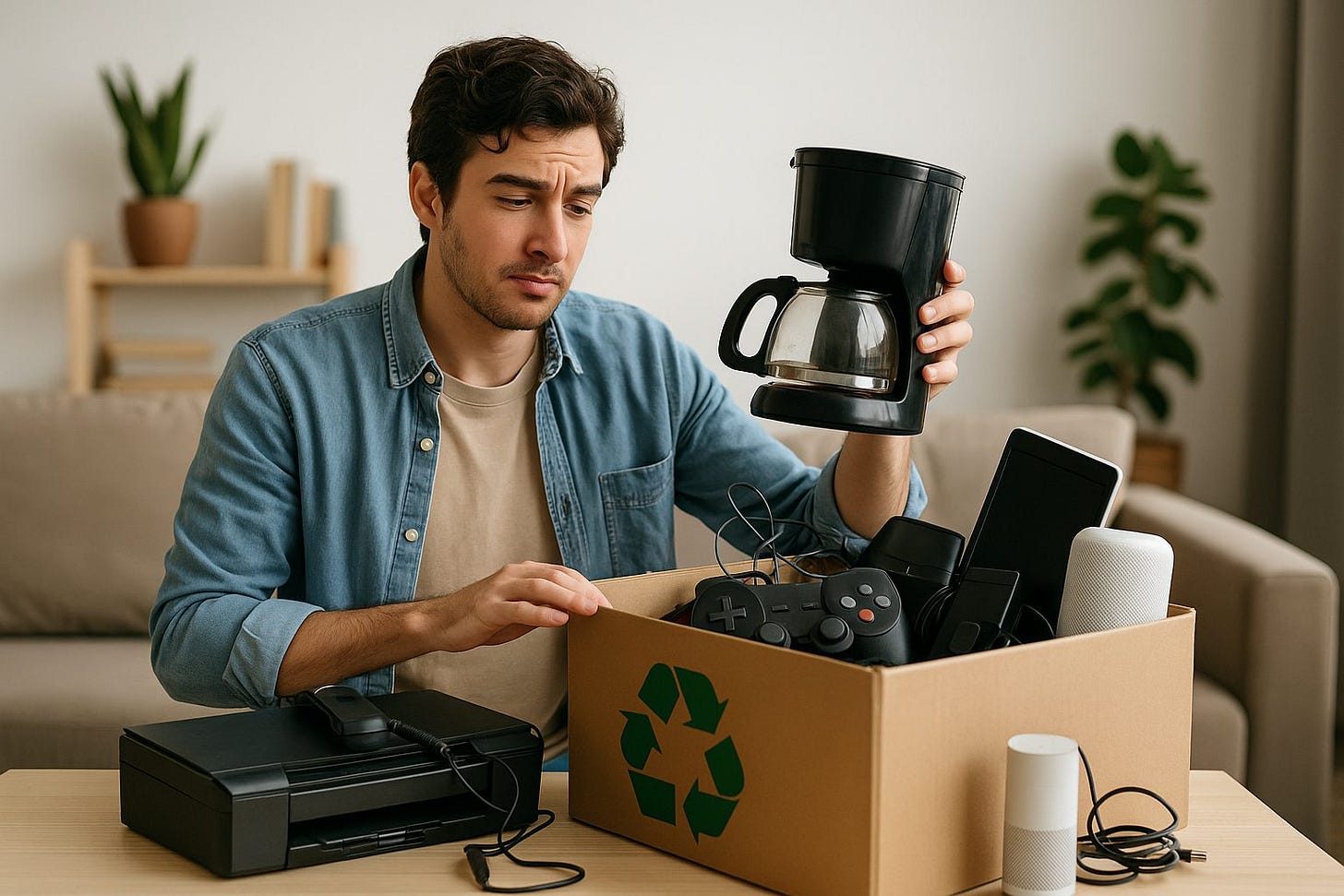8 Everyday Items You Didn’t Know Could Be Recycled with Tech
Unlocking the hidden ecosystems of e-waste around your home
You've heard about recycling bottles, cans, maybe even old phones. But what about the buzzing, whirring gadgets lurking in your kitchen, office, or bedside table that you assume are just landfill fodder? Belt-tightening, green-minded tech developments are showing us that many of the items we toss out were actually more valuable than we thought. I'm talking circuit boards, rare metals, plastics, glass—all with second chances.
This article uncovers 8 surprising everyday items that can be recycled with tech, i.e. treated as e-waste or processed using electronic/wired methods to extract reusable materials. By the end, you'll think twice before discarding almost anything that plugs in, requires batteries, or has wiring inside.
1. Coffee Machines & Small Kitchen Appliances ☕🍞
Your trusty coffee maker, toaster, kettle—these are more than just convenience tools. Inside, they carry heating elements, wiring, control boards, sometimes circuit boards. These bits are recyclable.
According to Elian Electronics Recycling, coffee machines and espresso makers qualify as e-waste because of their internal electronics and wiring.
Also, recycle-tech guides point out that small kitchen appliances like toasters, hairdryers, and irons aren't just junk—they contain metals, plastics, and sometimes rare components that should be diverted from landfills.
Why this matters: These appliances are everywhere. Recycling them recovers metals like copper, aluminum, even certain steel alloys, and reduces hazardous waste (think heating elements, insulation, plastic coatings).
2. Printers, Scanners, Fax Machines & Office Gear
Those bulky machines gathering dust in your home office or basement? They're e-waste gold.
United Electronic Recycling lists inkjet/laser printers, fax machines, and landline phones among surprisingly recyclable electronics.
Beyond just the shell: printers have rollers, motors, sensors, cartridges—many parts contain non-biodegradable substances or metals that can be reused.
Pro tip: Before recycling, remove ink or toner cartridges, take off external panels (if easy), and ask if the device stores any data (scanners, fax machines, some multifunction printers might).
3. Smart Home Devices & Networking Gear
Smart lights, thermostats, voice assistants, routers—modern homes are full of things that seem small but pack tech guts.
"Top 7 Electronics You Didn't Know You Could Recycle" by United Electronic Recycling includes smart home gear (Alexa, Nest, etc.) among items that people usually overlook.
These devices often have lithium-ion batteries, PCBs, sensors, chips—all of which are recyclable and sometimes hazardous if ended up in landfills.
4. Cameras, Camcorders, and Security Systems
Maybe you've got an old digital camera, a GoPro gathering dust, or a security camera from years back. Don't just leave them in a drawer.
Elian Electronics Recycling specifically names cameras among surprising items one can recycle.
Digital cameras and camcorders hold lenses, circuitry, batteries—and memory that often must be wiped or removed before recycling.
5. UPS Units, Batteries & Power Accessories
Uninterruptible Power Supplies (UPS), chargers, even power strips: these are often forgotten yet critical for safe recycling.
The list from Elian includes UPS devices under surprising recyclables.
Many "hidden" items like external hard drives, USB flash drives, cords, cables are recyclable because of their metal cores, insulated wiring, and sometimes precious metals.
6. Microwaves & Mini-Fridges / Larger Kitchen Appliances
Not every appliance is "small," but even larger kitchen units can be broken down and recycled.
Elian's "What Counts as E-Waste?" list includes microwaves and mini-fridges, because they have wiring, transformers or coils, plastics, and often metals worth recovering.
Everyday Recycler also mentions that large appliances need proper disposal due to complexity and potential hazards.
7. Entertainment Equipment & Gaming Consoles
That fat old TV, dusty DVD player, or ancient console isn't just nostalgic—it's recyclable.
According to "Top-7 Electronics You Didn't Know You Could Recycle," consoles and controllers are often accepted at recycling facilities.
Speakers, amplifiers, A/V equipment (projectors, soundbars) also have metals, magnets, wire, and circuitry inside.
8. Personal & Health Devices, Lighting & Small Miscellany
Some things you wouldn't immediately suspect but that carry enough tech to make recycling worth the trouble.
Personal grooming devices (electric razors, massagers), lighting (LED bulbs especially) are commonly included in household e-waste guidelines.
Smartwatches, fitness bands, wearable sensors also sometimes hold rare metals, batteries, and chips.
Challenges & How You Can Make It Work
Data & safety risks — Devices like routers, cameras, printers, even small appliances sometimes store personal or usage data. Always factory reset if possible, remove SD cards or drives.
Hazardous materials — Some items contain batteries, mercury (in older lights or switches), lead, flame retardants. These compounds require special handling.
Finding where to recycle — Not every municipal bin collects e-waste. Use certified e-waste centers, manufacturer take-back programs, or special collection events.
Why This Matters (Beyond "Being Green")
Because recycling tech isn't just good for soil and water—it's smart economics. Precious metals, rare earth elements, copper, gold, silver—all return value.
Also: regulatory and reputational risks are increasing. Being lazy with e-waste can cost you (or cost companies) in compliance or bad press. Knowing what items you have and disposing of them properly gives you control.
Also read: 10 Surprising Things You Didn't Know You Could (or Couldn't) Recycle
Call to Action
Do a scan around your house or workplace now. Grab one item from each of those 8 categories and check whether it's been sitting idle.
Find your nearest certified e-waste recycler. Ask them if they take all these items. Many will — you just might not know.
When next you buy a gadget, think longevity: Can it be repaired, reused, or recycled? Can you trust the brand's take-back program?
Final Thoughts
We live in a wired, plugged-in world, and that means our "junk" often holds value—if we're willing to peek inside. Every coffee maker, old router, or vintage console hides raw materials, metals, sometimes even sensitive data. Recycling them properly isn't just about being virtuous—it's about being smart.


